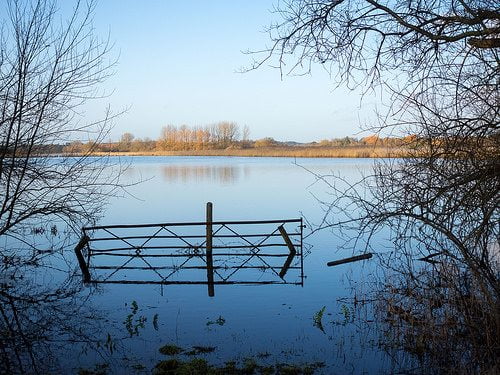

Environment
Government must invest more in flood defences, say MPs
The government must increase spending on flood defences if a repeat of the floods that devastated many parts of the UK last winter is to be avoided, MPs have warned.
In a new report on the crisis, which left many parts of the UK flooded for weeks and even months after the wettest winter on record, the environment committee says that funding for defences is still “at a bare minimum”.
A combination of storms, strong winds, heavy rain and high tides combined to flood around 7,000 homes and businesses around the country. Somerset in particular was badly hit, with some areas of the levels left underwater for three months.
MPs say that the government got its priorities wrong, in enforcing budget cuts on the Environment Agency and curtailing spending.
“The avoidance of flood events that devastate communities should, as far as is possible, take priority over cost-cutting”, the report says.
If funding is cut further and if more money is not found to carry out dredging and similar maintenance, equally severe flooding could hit the UK again as climate change increases the likelihood of extreme weather, it adds.
“Ministers must take action now to avoid a repeat of the devastation caused by the winter floods”, said Anne McIntosh, Conservative MP and chair of the committee.
“Regular work to dredge and keep rivers clear can be an essential flood prevention measure, yet this is exactly what gets squeezed out when budgets are tight.
“The government needs to recognise the importance of regular maintenance work and put it on an equal footing with building new defences,” she added.
Labour says the report is evidence that the government “failed to prepare”.
Floods minister Dan Rogerson has defended the government’s reaction to the floods, saying more has been spent during this parliament than ever before. Some environmental groups though have accused the government of manipulating the figures, while spending has been cut in real terms.
To give more transparency and allow the government more flexibility, the report calls for an end to the current split of spending between capital expenditure and revenue and maintenance, and merge the budget into a total expenditure approach.
Some experts have also criticised the report for focussing on dredging and neglecting to mention alternative measures of flood prevention that have been put forward.
Though the report acknowledges dredging must not be seen as an “all-purpose solution”, it notes that it could at least have shortened the duration of the flooding in Somerset.
However, Alastair Chisholm, of the Chartered Institute of Water and Environmental Management, told the BBC, “Within the community that manages flood risk there has been travel in the direction of looking at a whole range of measures to tackle the problem.
“It’s been moving in the right direction for years but this report really hasn’t taken that up and given it the backing it deserves.”
Earlier this month, researchers from the Met Office warned that flash floods are likely to become more frequent across much of the UK because of manmade climate change.
A separate study, published in April, concluded that global warming has increased the risk of extreme rainfall in southern England and Wales by about 20-25%.
Photo: Shaun Dunphy via Flickr
Further reading:
British public more receptive to flood-related climate change warnings
UK weather: one in four chance of hottest summer ever, says Met Office
Climate change increasing flood risk in the UK
UK weather will ‘change rapidly’ because of climate change, experts say
European flood losses could increase four-fold by 2050


 Environment11 months ago
Environment11 months agoAre Polymer Banknotes: an Eco-Friendly Trend or a Groundswell?

 Features10 months ago
Features10 months agoEco-Friendly Cryptocurrencies: Sustainable Investment Choices

 Features11 months ago
Features11 months agoEco-Friendly Crypto Traders Must Find the Right Exchange

 Energy10 months ago
Energy10 months agoThe Growing Role of Solar Panels in Ireland’s Energy Future





























